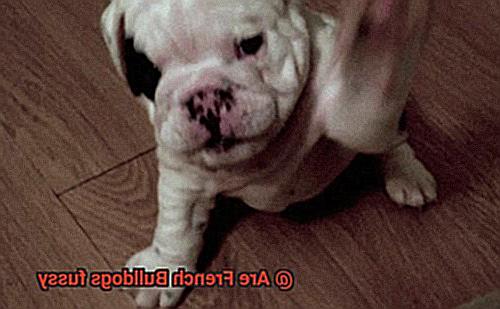Are French Bulldogs fussy?
Curious if French Bulldogs are fussy?
It’s a burning question for anyone considering these pint-sized pups as their new furry family member. French Bulldogs, affectionately known as “Frenchies,” have skyrocketed in popularity thanks to their irresistible charm and compact stature.
But do they really live up to their finicky reputation? Well, it’s time to set the record straight.
So, grab your favorite mug of java, get comfy, and let’s unravel the mystery behind these adorable little canines.
Are French Bulldogs fussy
Contents
- 1 Are French Bulldogs fussy
- 2 What Does Being ‘Fussy’ Mean for Dogs?
- 3 French Bulldogs as Picky Eaters
- 4 Environmental Sensitivity in French Bulldogs
- 5 Not All French Bulldogs Are Fussy
- 6 Strategies for Addressing Fussiness in French Bulldogs
- 7 Establishing a Consistent Feeding Schedule
- 8 Identifying Allergies and Sensitivities
- 9 Creating a Stress-Free Environment for Your Frenchie
- 10 Conclusion
French Bulldogs are known for their cute appearance and friendly nature, but they can also be fussy eaters. If you’re a French Bulldog owner struggling with your pup’s picky eating habits, don’t worry – you’re not alone. In this blog post, we’ll explore why French Bulldogs can be fussy eaters and provide some tips to help you overcome this challenge.
Sensitive Digestive System:
French Bulldogs have sensitive digestive systems, making them prone to digestive issues like flatulence and gastrointestinal sensitivity. To avoid these problems, choose high-quality, easily digestible dog food formulated specifically for French Bulldogs. Look for ingredients that are gentle on their stomachs, such as lean proteins and easily digestible carbohydrates.
Brachycephalic Anatomy:
The unique brachycephalic (short-nosed) anatomy of French Bulldogs can contribute to their fussiness. Their flat faces and narrow airways make it harder for them to chew and swallow food properly. To make mealtime easier for your Frenchie, provide smaller, bite-sized pieces of food or consider offering wet food options that are easier to consume.
Strong Preferences:
French Bulldogs have strong personalities and stubborn streaks, which can make them picky eaters. They may develop preferences for certain flavors or textures and refuse anything else. To address their fussiness, introduce new foods gradually and offer a variety of options over time. This will allow them to explore different tastes and textures while finding what they enjoy.
Health Issues:
Some French Bulldogs may develop fussiness due to health issues, such as dental problems. Tooth decay or gum disease can make eating painful for them, leading to aversion towards certain foods. Regular dental check-ups and professional cleanings are crucial to maintain their oral health and ensure a comfortable eating experience.
What Does Being ‘Fussy’ Mean for Dogs?
French Bulldogs are notorious for their fussy eating habits, but understanding the reasons behind their selective behavior can help you navigate this challenge and ensure your furry friend gets the nutrition they need.
- Sensitive Digestive Systems: French Bulldogs have delicate stomachs and can be prone to digestive issues. This sensitivity can make them more selective about what they eat. It’s important to choose a high-quality dog food that is easily digestible and doesn’t contain any potential allergens or irritants.
- Unique Brachycephalic Anatomy: French Bulldogs have a distinct facial structure with a short snout, which can make eating certain types of food more challenging. They may struggle with larger kibble sizes or foods that require excessive chewing. Opting for smaller, softer food options can make mealtime easier and more enjoyable for them.
- Strong Preferences and Stubborn Personalities: French Bulldogs are known for their strong personalities, and this extends to their food preferences. They may become fixated on a particular brand or flavor of food and refuse anything else. While it’s important to respect their preferences, it’s also essential to provide a balanced and nutritious diet. Gradually introducing new foods and flavors can help expand their palate while still meeting their dietary needs.
- Underlying Health Issues: Sometimes, fussiness can be a sign of an underlying health issue. If your French Bulldog’s picky eating habits are accompanied by other symptoms like weight loss, vomiting, or diarrhea, it’s crucial to consult with your veterinarian to rule out any medical conditions.
Remember, patience is key when dealing with a fussy French Bulldog. Don’t give in to their demands by constantly offering different foods or table scraps, as this can reinforce their picky behavior. Stick to a consistent feeding routine, offer a variety of nutritious options, and consult with your veterinarian for further guidance if needed.
French Bulldogs as Picky Eaters
We all know that one friend who is incredibly picky when it comes to food. Well, French Bulldogs are just like that friend. These adorable little pups can be quite selective when it comes to mealtime, and as a responsible owner, it’s important to understand why.
Sensitive Stomachs: Handle with Care
French Bulldogs have delicate digestive systems. Just like how some people can’t handle spicy foods or dairy products, these pups have their own dietary restrictions. Certain foods can cause stomach upset or allergies, leading them to refuse those meals altogether. To keep their tummy happy, choose high-quality, easily digestible foods for your furry friend.
Breathe Easy, Eat Slowly
Did you know that French Bulldogs have a short nose? This unique anatomy makes them prone to respiratory issues. Eating too quickly can worsen these problems, so they may take longer to eat or be more cautious about what they consume. Softer foods that are easier to chew and swallow may also be preferred by these little gourmands.
Stubborn and Proud of It
French Bulldogs are known for their stubborn nature. They are independent thinkers who are not easily swayed. Some of them may refuse to eat certain foods just because they feel like it or simply because they don’t find them appealing. It’s all part of their charming personality.
Tips and Tricks for Mealtime Success
To encourage your French Bulldog to eat, establish a regular feeding schedule. By feeding them at consistent times each day, they will become accustomed to the routine and may be more willing to indulge in their meals. Avoid free-feeding, as this can lead to picky eating habits and make it difficult to monitor their food intake.

When in Doubt, Vet It Out
If your French Bulldog consistently refuses to eat or shows signs of appetite loss, it’s crucial to consult with a veterinarian. There could be underlying health issues causing the picky eating behavior. A professional can provide guidance and solutions to ensure your furry friend stays healthy and well-fed.
Environmental Sensitivity in French Bulldogs
French Bulldogs are known for their sensitive nature, and this extends to their sensitivity to their environment. These adorable little dogs can be easily affected by their surroundings, which can impact their overall well-being and behavior. Understanding the environmental factors that can affect French Bulldogs is important for their owners to provide them with a safe and comfortable living environment.
Temperature Sensitivity
French Bulldogs are more prone to heatstroke and overheating compared to other breeds due to their brachycephalic nature. It is crucial for owners to ensure that their French Bulldogs have access to cool, shaded areas during hot weather and avoid taking them out for walks during the hottest parts of the day. Leaving them in a car unattended is a big no-no, as temperatures inside a vehicle can quickly rise to dangerous levels. On the other hand, French Bulldogs are also sensitive to cold weather, so it is essential to keep them warm during winter months with suitable clothing or blankets.
Noise Sensitivity
French Bulldogs tend to be more sensitive to loud noises compared to other breeds. They may become anxious or fearful when exposed to sudden or prolonged loud noises such as thunderstorms, fireworks, or construction sounds. Owners should create a safe and quiet space for their French Bulldogs during these events, using noise-cancelling headphones or providing a cozy den-like area where they can retreat.
Changes in Environment or Routine
French Bulldogs thrive on stability and can become stressed or anxious when faced with sudden changes. Moving to a new home, changes in household members, or alterations in their daily routine can all affect their emotional well-being. Owners should provide a stable and consistent environment for their French Bulldogs and introduce any changes gradually.
Chemical Sensitivities
French Bulldogs can be sensitive to certain chemicals or allergens present in their environment. They may develop allergies or sensitivities to household cleaners, air fresheners, certain fabrics, or even pollen. Owners should be mindful of the products they use around their French Bulldogs and consult with a veterinarian if they suspect an allergic reaction.
Not All French Bulldogs Are Fussy
French Bulldogs are often associated with being fussy eaters, but the truth is, not all of them fit that stereotype. While some Frenchies may have specific preferences or picky eating habits, it is important to remember that this does not apply to the entire breed. As an expert in French Bulldogs, I can shed some light on why not all Frenchies are fussy and offer some tips on how to manage fussiness if it does arise.
Individual Preferences and Upbringing
Just like humans, dogs can develop individual preferences and aversions to certain foods or textures. This can be influenced by various factors, including their upbringing, previous experiences, and overall temperament. Some French Bulldogs may have been exposed to a limited range of foods during their early development, leading to a narrower palate. Others may have had negative experiences with certain foods, causing them to be more cautious or selective in their eating habits.

Health Issues
Fussiness in French Bulldogs can also be a result of health issues or underlying conditions. If a normally non-fussy Frenchie suddenly becomes selective with their food or shows signs of disinterest in eating, it is crucial to consult a veterinarian. Health problems such as dental issues, digestive disorders, or allergies can contribute to fussiness and should be addressed promptly.
Proper Nutrition
Proper nutrition plays a significant role in preventing and managing fussiness in French Bulldogs. Feeding them a well-balanced diet that meets their nutritional needs is essential. This can include a combination of high-quality commercial dog food, fresh fruits and vegetables, and occasional treats. It is important to choose a diet that is appropriate for their age, size, and activity level. Consulting with a veterinarian or a canine nutritionist can help ensure that your Frenchie is receiving the right nutrients.
Variety and Gradual Changes
Introducing variety into their diet can help prevent fussiness. Offering different flavors, textures, and types of food can keep them engaged and interested in their meals. However, it is important to make changes gradually to avoid digestive issues or food aversions. Start by mixing small amounts of new food with their regular diet and gradually increase the proportion over time.
Consistent Feeding Schedule
Establishing a consistent feeding schedule can also help reduce fussiness in French Bulldogs. By feeding them at regular intervals, they learn to expect and anticipate meal times, which can decrease the likelihood of them becoming fussy. Avoid free-feeding or leaving food out all day, as this can lead to picky eating behaviors.
Training and Positive Reinforcement
Training and positive reinforcement techniques can also play a role in minimizing fussiness. By rewarding them for eating their meals and following commands related to mealtime behavior, French Bulldogs can develop positive associations with food and mealtime routines. This can help create a more relaxed and enjoyable eating experience for both the dog and the owner.
Strategies for Addressing Fussiness in French Bulldogs
With a combination of patience, persistence, experimentation, and professional advice, you can help your fussy Frenchie develop healthier eating habits. In this article, we’ll explore some tried-and-true strategies to address fussiness in French Bulldogs.

Mix it Up:
Try different types of food and flavors to find what your French Bulldog prefers. Some dogs may have specific ingredient or flavor preferences, so experimenting with different options can help identify what works best for your dog’s taste buds. Remember to choose high-quality, nutritious foods to ensure your furry friend is getting the right nutrients.
Wet Food Temptations:
Mixing wet food with dry kibble can make the meal more appealing to a fussy French Bulldog. The added moisture and different texture can entice them to eat. Just make sure the wet food is free from harmful ingredients and provides a balanced diet.
Tantalizing Toppings:
Adding some delicious toppings or mix-ins like cooked chicken, beef, or vegetables can make mealtime more enticing for your Frenchie. However, avoid using seasonings or spices that may be harmful to dogs. Keep it simple and nutritious.
Establish a Routine:
Consistency is key when it comes to feeding your French Bulldog. Establishing a regular feeding routine by feeding them at the same time each day and in the same location can create a sense of routine and reduce any anxiety or hesitation they may have towards their food.
Patience and Persistence:
Dealing with a fussy eater requires patience and persistence. It might take some trial and error to find what works best for your Frenchie. Don’t give up or give in to their picky eating habits, as this can reinforce their fussiness. Stay consistent and positive throughout the process.
Seek Professional Advice:
If your French Bulldog continues to refuse food despite your best efforts, it’s important to consult with a veterinarian. They can rule out any underlying health issues that may be causing the fussiness and provide further guidance on how to address it.
Establishing a Consistent Feeding Schedule
But fear not. In this guide, we’ll unleash the secrets to satisfying your French Bulldog’s finicky appetite and create a routine that will have them licking their chops in anticipation.
Choose the Right Fuel:
Just like us humans crave a balanced diet, French Bulldogs need their fair share of nutrients too. Opt for a high-quality dog food specifically formulated for their unique nutritional needs. Look for ingredients like lean protein, whole grains, healthy fats, and essential vitamins and minerals.
Divide and Conquer:
To prevent bloating and keep their energy levels steady throughout the day, split your French Bulldog’s daily food intake into several small meals. Try offering three to four meals at regular intervals rather than one or two large servings.
Say No to Free-Feeding:
While it may be tempting to leave food out all day for your picky eater, resist the urge. Free-feeding can lead to fussy eating habits. Instead, offer meals at specific times and remove any uneaten food after 15-20 minutes.
Set a Routine:
Dogs thrive on routine, so establish a consistent feeding schedule that works for both you and your pup. Whether it’s breakfast at 8 am or dinner at 6 pm, stick to the same meal times every day. This will help reduce fussiness and make mealtime more predictable for your furry friend.
Portion Control is Key:
Keep an eye on your French Bulldog’s eating habits and adjust portion sizes accordingly. Factors like age, activity level, and overall health can affect their food requirements. Consult with your veterinarian to ensure you’re providing the right amount of food for your pup.
Make Mealtime Fun:
Sometimes, a little bit of extra excitement can do wonders to entice your French Bulldog to eat. Consider introducing a feeding puzzle or interactive toy that will stimulate their natural instincts and make mealtime a thrilling adventure.
Seek Professional Guidance:
If your French Bulldog consistently turns up their nose at mealtime or shows signs of being excessively fussy, it’s essential to consult with a veterinarian. They can rule out any underlying health issues and provide expert advice on how to address the problem.
Identifying Allergies and Sensitivities
Mealtime can be a thrilling adventure for French Bulldog owners, but it can also be a challenging task if your furry friend is a picky eater. In this blog post, we will share expert tips and tricks to satisfy your French Bulldog’s finicky appetite. From creating a routine to introducing new flavors, get ready to unleash the secrets to make mealtime an exciting and enjoyable experience for both you and your French Bulldog.
Establish a Feeding Routine:
French Bulldogs thrive on routine, so establishing a consistent feeding schedule is essential. Feed your pup at the same time each day, and avoid free-feeding to encourage healthy eating habits. Set aside a specific area for meals and make it a calm and quiet space, away from distractions.

Choose High-Quality Food:
When it comes to feeding your French Bulldog, quality matters. Opt for high-quality dog food that is specifically formulated for their breed’s nutritional needs. Look for options that contain real meat as the first ingredient and avoid fillers or artificial additives. If your pup has allergies or sensitivities, consult with your veterinarian to find the best hypoallergenic or limited ingredient diet.
Introduce New Flavors:
French Bulldogs can be hesitant when it comes to trying new foods. To introduce new flavors, mix a small amount of the new food with their regular food and gradually increase the ratio over time. This gradual transition will help your Frenchie adjust to the new taste without upsetting their sensitive stomach.
Add Tasty Toppings:
If your French Bulldog needs some extra encouragement to eat, consider adding tasty and nutritious toppings to their meals. Plain yogurt, bone broth, or a spoonful of pumpkin puree can entice even the pickiest eaters. Just make sure to avoid toppings that are high in fat, sodium, or sugar.
Provide Interactive Feeders:
French Bulldogs are intelligent and active dogs, and providing them with interactive feeders can make mealtime more engaging and stimulating. Puzzle feeders or slow-feed bowls not only slow down their eating pace but also provide mental stimulation, preventing boredom and promoting a healthy weight.
Creating a Stress-Free Environment for Your Frenchie
French Bulldogs, with their sensitive nature, require a stress-free environment to thrive. As a responsible owner, it is important to provide them with a comfortable and peaceful space where they can relax and feel secure. Here are some tips to help you create a stress-free environment for your Frenchie:
- Designated Relaxation Area: Set up a cozy space for your Frenchie, complete with a soft bed, blankets, and toys. This will give them a safe and comfortable spot to unwind.
- Calm and Quiet: French Bulldogs can be easily stressed by loud noises and excessive activity. Keep the environment calm and quiet, especially during their rest periods.
- Temperature Control: French Bulldogs are sensitive to extreme temperatures. Make sure their living space is kept at a comfortable temperature and provide access to cool water and shade during hot weather.
- Consistent Routine: Establishing a consistent daily routine is crucial for reducing stress in French Bulldogs. Stick to regular feeding times, exercise schedules, and playtime to provide them with a sense of security.
- Avoid Sudden Changes: French Bulldogs thrive on stability and familiarity. Try to avoid sudden changes or disruptions in their environment whenever possible.
- Clean Living Space: A clean living space is not only important for hygiene but also helps reduce the risk of allergies or skin irritations. Keep their area clutter-free and regularly clean their bedding and toys.
- Mental Stimulation: Provide mental stimulation for your Frenchie through interactive toys or puzzles. This helps keep their minds engaged and distracts them from potential stress triggers.
- Calming Products: Consider using pheromone diffusers or calming sprays in their living area to create a soothing atmosphere. These products can help alleviate anxiety and promote relaxation.
- Quality Time: Spend quality time with your Frenchie, offering plenty of love, attention, and positive reinforcement. Building a strong bond with your pet helps them feel secure and reduces stress.
- Seek Professional Help: If you notice signs of stress or anxiety in your French Bulldog despite your efforts, consult with a veterinarian or animal behaviorist for further guidance. They may be able to provide additional strategies or recommend specialized training techniques to address your Frenchie’s specific needs.
rsTjJjYg608″ >
Conclusion
In conclusion, it is safe to say that French Bulldogs can indeed be quite fussy.
These adorable little creatures have a tendency to be selective when it comes to their food, often turning up their snouts at anything that doesn’t meet their high standards. They may also exhibit picky behavior when it comes to their toys and bedding, preferring only the finest and most comfortable options.
However, it’s important to note that not all French Bulldogs are fussy, as individual personalities can vary greatly.




